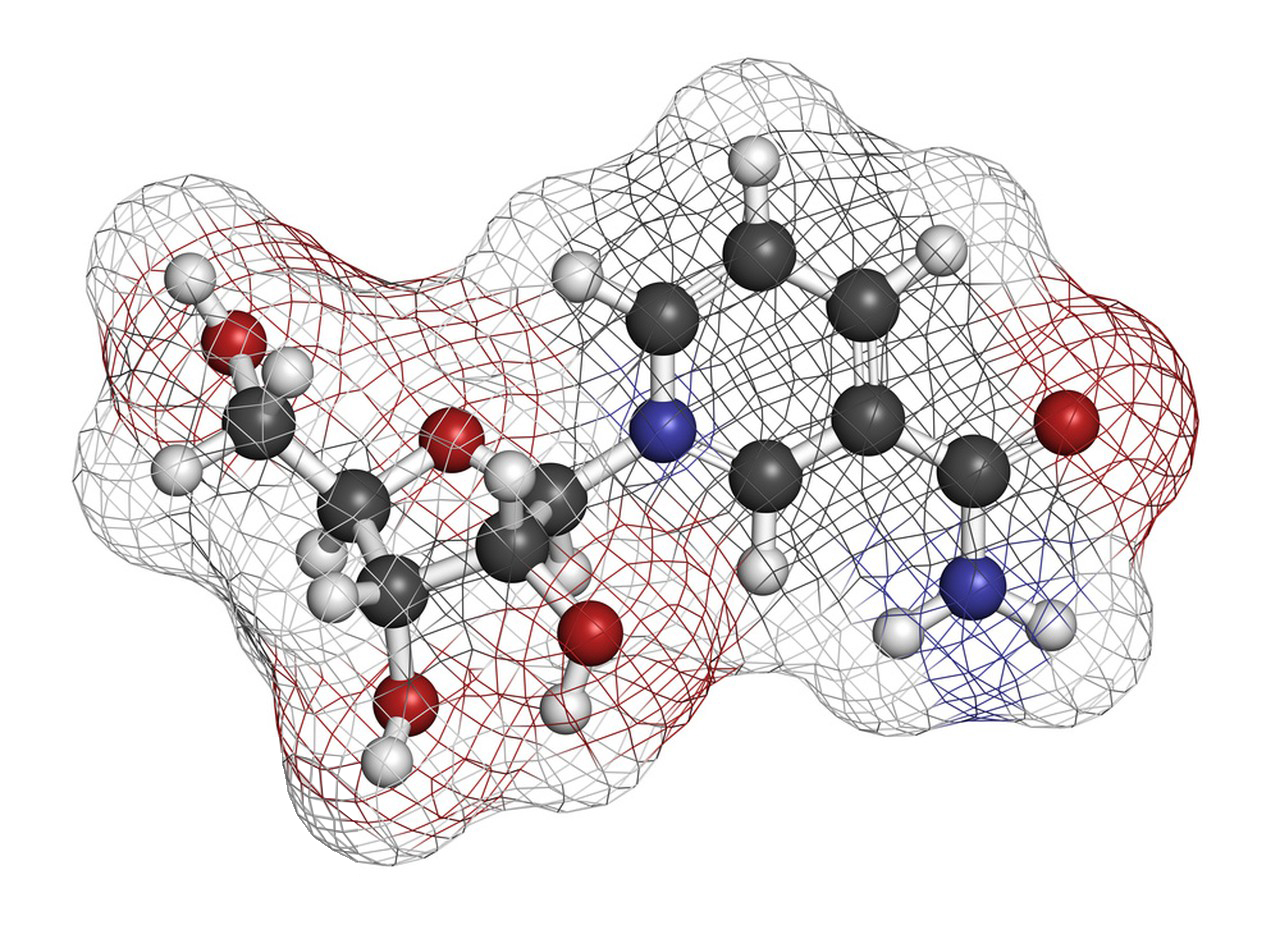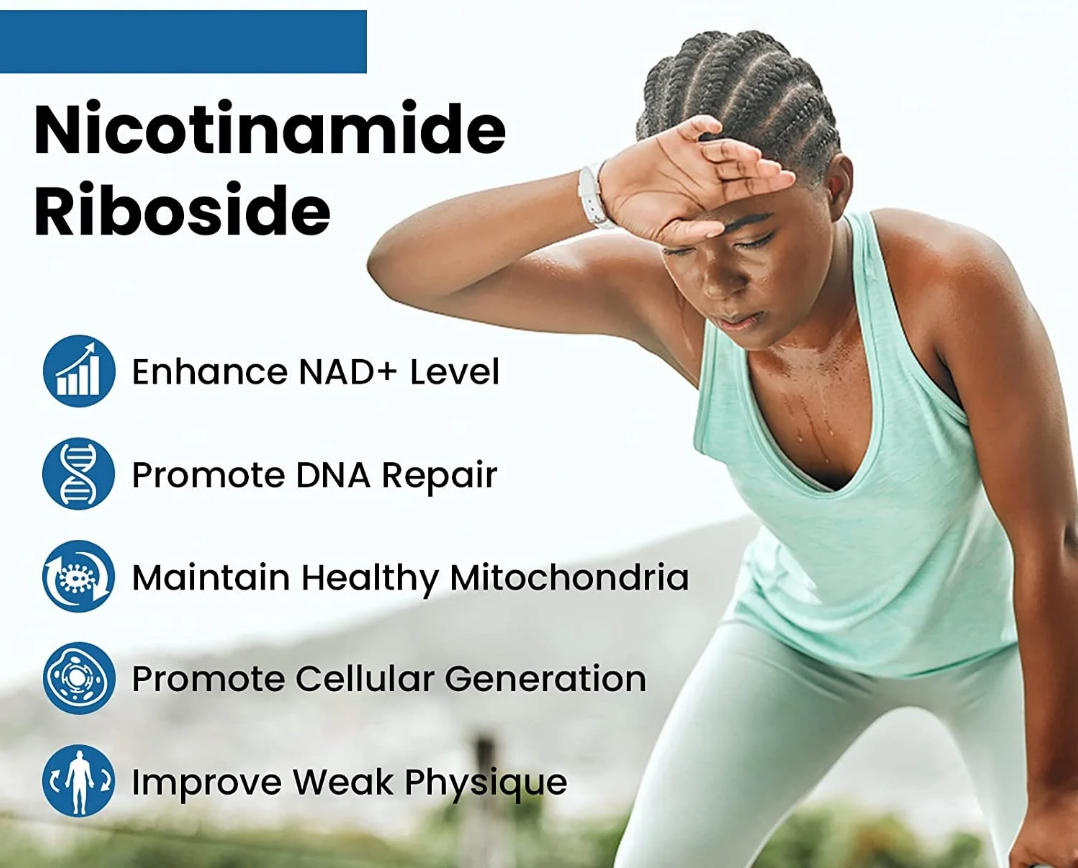Nicotinamide riboside (NR) is a form of vitamin B3 that has gained significant attention due to its potential health benefits, particularly in the context of aging, metabolic health, and cellular function. Research on NR spans several domains, including its role in boosting NAD+ (Nicotinamide adenine dinucleotide) levels and its implications for various diseases. Here are some of the key research directions currently being explored:
1. NAD+ and Aging
- NAD+ Decline with Age: As people age, NAD+ levels in cells tend to decline, which is believed to contribute to aging-related diseases and a decrease in cellular function. Nicotinamide riboside is a precursor to NAD+, and much research is focused on its ability to boost NAD+ levels and potentially slow down the aging process.
- Sirtuins Activation: NAD+ is critical for the activation of sirtuins, a family of proteins involved in cellular stress resistance, DNA repair, and inflammation regulation. Researchers are exploring how NR supplementation might activate sirtuins and protect against age-related conditions like neurodegeneration, cardiovascular disease, and metabolic disorders.

2. Metabolic Health and Obesity
- Improving Insulin Sensitivity: Studies have shown that Nicotinamide riboside can enhance insulin sensitivity, making it a potential therapeutic target for metabolic diseases like type 2 diabetes and obesity. Research is ongoing to understand the precise mechanisms through which Nicotinamide riboside influences metabolic pathways.
- Weight Management: There is interest in how NR might influence fat metabolism and weight loss, with some evidence suggesting it could help reduce fat accumulation in animals. Clinical trials are exploring its efficacy in humans.
3. Neuroprotection and Cognitive Health
- Neurodegenerative Diseases: Nicotinamide riboside’s ability to increase NAD+ levels is being investigated for its potential in preventing or treating neurodegenerative diseases like Alzheimer’s, Parkinson’s, and Huntington’s diseases. NAD+ plays a crucial role in maintaining mitochondrial function and protecting neurons from oxidative damage.
- Cognitive Function: Research is exploring whether Nicotinamide riboside supplementation can improve cognitive function in aging populations or individuals with early signs of cognitive decline. The focus is on its role in mitochondrial health and neuronal repair mechanisms.
4. Mitochondrial Function and Cellular Health
- Mitochondrial Biogenesis: Nicotinamide riboside, by increasing NAD+ levels, may promote mitochondrial biogenesis, the process by which new mitochondria are formed. This is significant because mitochondria are central to energy production and cellular health. Research is looking into Nicotinamide riboside’s potential to enhance mitochondrial function in age-related diseases.
- Cellular Stress and Repair: NAD+ is also involved in the regulation of cellular responses to stress, such as oxidative stress and DNA damage. Research is examining how Nicotinamide riboside supplementation might help cells maintain their integrity in the face of these stressors, potentially reducing the risk of cancers and other diseases.

5. Cardiovascular Health
- Vascular Function: Some studies suggest that Nicotinamide riboside can improve endothelial function and reduce the risk of cardiovascular disease by increasing NAD+ levels and supporting better vascular health. The mechanism involves improved mitochondrial function in the cells lining the blood vessels.
- Blood Pressure Regulation: There is preliminary evidence suggesting that Nicotinamide riboside might help lower blood pressure, which is a significant risk factor for cardiovascular disease. This area of research is still in its early stages.
6. Cancer
- Cancer Prevention and Treatment: There is emerging research on the role of NAD+ in cancer metabolism. Some studies suggest that Nicotinamide riboside and other NAD+ precursors might enhance the effectiveness of chemotherapy and radiation therapy, while others explore whether increasing NAD+ levels might help prevent cancer by supporting DNA repair and cellular stress responses.
- Tumor Metabolism: Since cancer cells often have altered metabolism, researchers are studying how Nicotinamide riboside supplementation could influence the energy production pathways in cancer cells and whether it could inhibit tumor growth or increase the susceptibility of cancer cells to treatment.
7. Immune System Function
- Immune Response: NAD+ is involved in regulating immune cell function, including the activation of T cells and macrophages. Research is investigating how Nicotinamide riboside might modulate immune responses, particularly in the context of chronic inflammation and autoimmune diseases.
8. Longevity and Lifespan
- Caloric Restriction Mimetic: Nicotinamide riboside is sometimes considered a “caloric restriction mimetic” because of its effects on cellular metabolism. Caloric restriction has been shown to extend lifespan in multiple organisms, and NR is being explored for its ability to mimic some of these benefits without the need to restrict food intake.
- Longevity Pathways: Research is examining the role of NAD+ in various longevity-associated pathways, such as the activation of longevity genes and the regulation of cellular senescence.

9. Human Clinical Trials
- Safety and Efficacy: Clinical trials are investigating the safety, dosage, and long-term effects of Nicotinamide riboside supplementation in humans. While early trials have shown that NR is well-tolerated and may increase NAD+ levels in the blood and tissues, larger and longer studies are needed to assess its long-term impact on health and disease prevention.
Conclusion
Nicotinamide riboside is being studied for its potential to address a wide range of health concerns, from aging and metabolic diseases to neurodegeneration and cardiovascular health. Its ability to increase NAD+ levels and support mitochondrial function underlies many of its proposed benefits. While the research is promising, much of it is still in the preclinical or early clinical stages, and more studies are needed to establish its effectiveness and safety for various applications.
